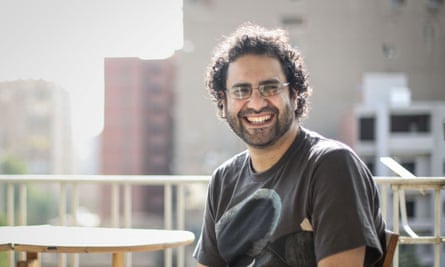[ad_1]
As Egyptian officials strive to control the narrative and isolate the case of the detained British Egyptian activist Alaa Abd el-Fattah, pressure is mounting on world leaders at Cop27 to acknowledge Egypt’s poor human rights record and raise his case.
The Egyptian authorities have engaged in a sweeping public relations campaign to try to discredit Abd el-Fattah, including a digital campaign depicting him as a threat to national security.
A visibly shaken Sameh Shoukry, Egypt’s foreign minister and Cop27 president, told CNN that “this is a judicial matter, the person in question has had a fair trial … there should be respect for the judicial system.” Shoukry also cast doubt on Abd el-Fattah’s dual nationality, after he gained British citizenship while in prison last year.
Egyptian prison officials told his family that the democracy activist had “undergone a medical intervention with the knowledge of a judicial authority,” suggesting he had been either force-fed or forcibly given intravenous medication. Abd el-Fattah had been on a partial hunger strike for six months before he decided to escalate it by refusing food and water entirely from Sunday 6 November.
“We’re incredibly worried that medical decisions for Alaa are not being made by independent doctors free from interference and coercion by the Egyptian authorities,” Freshta Sharif of Amnesty International UK said on Friday. “Earlier today, Alaa’s lawyer Khalid Ali was again denied access to him, part of a pattern of attempting to hide Alaa’s case from the outside world.”

Despite Egyptian officials’ efforts to present current events as business as usual, the spotlight shone on the host country for the Cop27 climate negotiations in the resort town of Sharm el-Sheikh has also prompted increasing global scrutiny of their human rights record.
Both the French president, Emmanuel Macron, and the German leader, Olaf Scholz, raised Abd el-Fattah’s case with the president, Abdel Fatah al-Sisi, during the talks, and Sisi reportedly told Macron he would ensure that the activist’s health “is preserved” during the conference.
The US president, Joe Biden, is due to meet Sisi at Cop27. Before Biden left for Egypt, a senior administration official said he would raise human rights concerns, but did not say whether he would raise Abd el-Fattah’s case specifically. The secretary of state, Antony Blinken, praised Egypt’s “tangible progress on human rights” in a recent call with Shoukry shortly before Cop27.
Sisi and his officials have attempted to position Cop27 as an opportunity to showcase the country’s ability to discuss key environmental issues and welcome international delegates, while attempting to gloss over the country’s human rights record. This includes an estimated 65,000 political prisoners and almost a decade-long crackdown on civil rights and political freedoms.
Security forces in the Egyptian capital, Cairo, and elsewhere have worked to crush protests planned on Friday, as Egyptians furious at the country’s deep economic crisis and dictatorial rule united online under the hashtag “go down on 11/11 and free your country”. Rights groups said security forces arrested more than 150 people in the weeks leading up to the protest.
“I think they’re feeling the pressure [over Abd el-Fattah] finally,” said Hussein Baoumi of Amnesty International. “I understand that it’s now about Sisi personally refusing to relent, but he’s understood that the cost of Alaa dying is just too much. I think the Biden visit is key now, and the UK needs to play a more confrontational role.”
“Sisi places a high value on being embraced by Western capitals, being seen as a peer amongst world leaders, and being in good standing with his partners in the EU and the US, and so these photo opportunities, state visits and summits are all valuable opportunities to press for concessions,” said Timothy E Kaldas of the Tahrir Institute for Middle East Policy.
On Thursday protesters gathered outside the Cop27 conference centre wearing white, the colour that Egyptian detainees wear before sentencing, holding banners that read “no climate justice without human rights, we have not been defeated”, in reference to the title of a book of essays written by Abd el-Fattah.
“They [the Egyptian authorities] need to find a way out, but now they’re cornered. They’re trying to see what they can do with all this pressure from inside and outside,” said Mohamed Anwar Sadat, the nephew of Egypt’s former president and a well known intermediary who has negotiated the release of tens of prisoners of conscience from inside the country’s sprawling detention system.
“It’s become very complicated,” he said. “Personally I don’t feel good about this as they didn’t listen months ago or they’d be in a better position. I hope they take a decision to release him soon.”
[ad_2]




